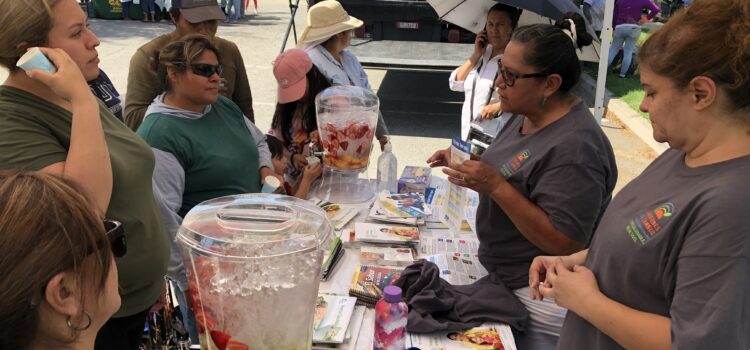
Across the Central Valley are health advocates working to reach rural communities to inform them on how to improve their health. These advocates are called promotores.
Educating communities on mental health, nutrition, exercise, reproductive health, environmental health, discrimination, domestic violence, dental care, stress caused by a fear of deportation, chronic illness, disability and Valley Fever, just to name a few, are all part of the job description of a modern-day promotor.
“It’s people that look like them, that talk their language…That’s the key characteristic,” said Dr. Tania Pacheco-Werner, a research scientist at Fresno State’s Central Valley Health Policy Institute. “Bridging that gap between resources in the community and the group or at their home, that’s their secret sauce.”
Pacheco-Werner has researched how promotores help Latinos improve access to healthcare in the Central Valley. She says promotores are an answer to the question: “How do you reach rural communities, hard-to-reach communities or communities where trust is lacking?”
The promotor model has been used to address all sorts of health issues around the world, according to Pacheco-Werner. Countries with national health care systems, including Russia, China and Latin American countries, have relied on promotores to bridge the gaps in health care, particularly in rural areas.
Melinda Cordero-Bárzaga began working as a promotor in the 1980’s. She is now the associate director of Visión y Compromiso, a network that trains promotores in California and Nevada.
Cordero-Bárzaga said the promotor model works mainly because of one thing: “They may not have all of the resources or all of the money but they have human beings.”
The promotor model is an empowering one, she said, because the same people working to address a health issue may be dealing with the similar problems themselves.
“That brings hopes to her and her community,” she said. “That builds a lot of power in her community.”
Pacheco-Werner said being able to relate to one another is what makes the model so strong. Promotores are lay people who can explain common misconceptions, like why corn tortillas or juice aren’t great ways to get the daily servings of fruits and vegetables.
Promotores are not just health clinics. They visit homes and do community outreach work in churches, festivals, food banks, schools, hair salons and the fields.
In Kern County, a regional committee of Visión y Compromiso promotores work to address the needs within agricultural communities in Delano, Arvin and Lamont. The committee organizes health fairs, hoping to help solve health problems farm workers face.
To help with better health outcomes, promotores are also involved in political work. Every year a group of promotores with Visión y Compromiso visit the state capitol on their annual legislative day where they advocate for a slate of legislation for their communities.
“The promotores aren’t a silver bullet if at the end of the day policy issues haven’t been solved,” Pacheco-Werner said.
This year, promotores advocated for full coverage in their communities under the banner of Health4All. This included a pair of bills in the Assembly and Senate that would extend Medi-Cal coverage to undocumented citizens. Another bill would offer preventive asthma services to families on Medi-Cal. One bill would expand dental services for people with special needs. And another bill in the assembly would require mental health care plans to assess their cultural competency.
A lot of the work promotores do is on a volunteer basis, and Visión y Compromiso likes to say their promotores are doing servicio de corazón or service of the heart.
Some of them happily work with little to no pay to further the health and power of their community, but Cordero-Bárzaga told legislators she hopes to see that change, too.
Recently, health organizations saw the benefits of promotores and began offering the volunteers stipends, offsetting the costs of childcare and gas.
But promotores doing work in low-income immigrant communities lack economic resources themselves, and Cordero-Bárzaga said a stipend doesn’t cut it. She notes that the most marginalized promotores, such as those who are undocumented or don’t speak English, may have the most trouble getting paid a fair wage.
The promotor model has shown to be effective and efficient. Research Pacheco-Werner conducted found promotores helped Latinos in Fresno County access health education, something they had trouble doing before due to language barriers and a lack of trust in the healthcare system. Her study found 69 percent of participants said they would recommend working with a promotor to someone else.
A 2016 Families USA brief on community health care workers said the model also saves dollars. A program in rural Arkansas found community health care workers reduced Medicaid costs by $3.5 million. And a study in New Mexico found community health workers who worked with patients with high needs ended up saving four dollars for every dollar invested.
“You start a web: you give them information, they transmit it to neighbors, you have a whole community transforming through diffusion,” Pacheco-Werner says. “That’s a powerful thing.”
RELATED CONTENT: ‘PASSION HELPS HER COMMUNITY’: PROMOTORA EDUCATES KERN RESIDENTS ON HOW TO LIVE A HEALTHY LIFESTYLE
South Kern Sol is a youth-led journalism organization in Kern County. In their stories, youth reporters shine light on health and racial disparities in under-served communities across Kern. For more stories by South Kern Sol, head to southkernsol.org.